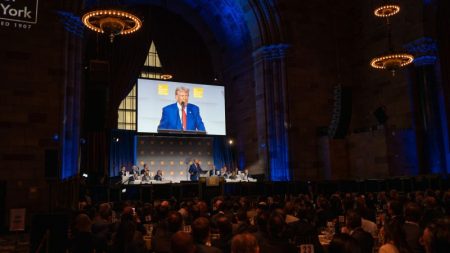Unlock the US Election Countdown newsletter for free
The stories that matter on money and politics in the race for the White House
China’s defence minister has delivered a scathing attack on Taiwan’s new president Lai Ching-te, warning that Taiwan’s ‘aggressive’ behaviour and foreign moves to abet it were eroding prospects for peaceful unification.
Dong Jun said Lai and his new government were “now using military means to reject unification and making a lot of noise about arming themselves”.
“Facing the strong military of the big motherland, such armed conspiracies will be futile [and] will only lead to their own destruction more rapidly,” Dong told the Shangri-La Dialogue in Singapore, Asia’s largest security conference.
Driven by China’s increasing military intimidation campaign since Lai’s Democratic Progressive party took power in 2016, Taipei has increased defence spending and started reforming its armed forces, including compulsory military service and more rigorous training.
Dong told the conference: “We always strive for peaceful unification. But the prospects for that are currently being eroded by the ‘Taiwan independence’ separatists and external forces” — a reference to the US, which has prodded Taiwan to do more for its own security.
Moves such as selling weapons to Taiwan “send very wrong signals to ‘Taiwan independence’ forces and embolden them to become very aggressive”, Dong said.
He added: “I call on the ‘Taiwan independence’ forces to wake up and return on the path to unification. Diligently study the relevant laws and don’t touch upon the red lines of the Anti-Secession Law.”
The law, adopted by Beijing in 2005, spells out that China shall use “non-peaceful means” if anyone causes Taiwan’s secession or if “prospects for peaceful unification [are] completely exhausted”.
Lai and his DPP reject Beijing’s claims and insists Taiwan, under its official name Republic of China, is a sovereign independent nation — a position backed by majority public opinion.
Lai’s inauguration on May 20 was followed by two days of Chinese military exercises around the island that the People’s Liberation Army said was a “punishment”.
Taiwan expressed regret about Dong’s “provocative, irrational” comments.
“The Chinese Communist party has once again threatened Taiwan and neighbouring countries with militant statements; the risk that its totalitarian system damages regional security has already risen,” said the Mainland Affairs Council, the cabinet-level China policy body.
Dong’s language towards Taiwan contrasted with China’s efforts to manage its military relationship with the US more carefully. On Friday, Dong met US Defence Secretary Lloyd Austin for the first time, talks both sides described as positive.
In Dong’s speech to the conference he portrayed China as a responsible great power seeking to safeguard regional peace and stability.
“We advocate the settlement of disputes through dialogue and consultations and not the law of the jungle,” he said, pledging to support weaker states by helping them educate their military and assist with humanitarian and disaster relief.
Dong also repeated China’s pledges to work towards a peaceful resolution of the Ukraine conflict, but gave no new detail. He said Beijing was not providing weapons to either conflict party and was strictly controlling exports of dual-use goods.
“The Chinese military never acts from position of strength . . . but others should not [ . . . ] impose their will on us,” Dong said. He added that countries in Asia-Pacific had the capability and confidence to solve their own problems and did not need to “take orders from hegemonic powers”.
Both remarks are common swipes at the US and its military dominance in the region. On Friday, a senior Chinese military official described Washington’s moves to strengthen its alliances as attempts to create an Asia-Pacific Nato”.
Dong spoke about those grudges in less sharp terms than past Chinese defence ministers, echoing Austin’s tone who also largely avoided castigating China directly in his speech a day earlier.
But Dong angrily rejected a challenge from the audience that actions by the Chinese coast guard against Philippine ships in the South China Sea ran counter to its stated peaceful intentions. Hitting out against Manila’s position that it is within its rights accessing and using the disputed Second Thomas Shoal, Dong said the Philippines was “blackmailing justice and kidnapping the law”.
The US rejected Dong’s arguments. “Every year for three years, a new Chinese defence minister has come to Shangri-La. And every year, they’ve given a speech at complete odds with the reality of the PLA’s coercive activity across the region,” said a US official. “This year was no different.”
Read the full article here



